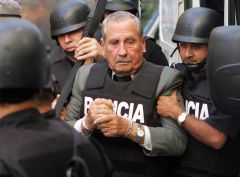By Patrick Vanderpool
Impunity Watch Reporter, South America

MONTEVIDEO, Uruguay – Uruguay’s high court recently declared a law providing amnesty for human rights violations committed during the 1973-1985 dictatorship unconstitutional.
The Court’s decision coincides with controversial Congressional efforts to overturn the law, which protects former military and law enforcement officials from prosecution as a result of rights abuses.
The issue most recently came to public attention in the case of Juan Maria Bordaberry, a former “strongman” who is said to be responsible for 20 deaths. Bordaberry ruled as democratically elected president from 1972 to 1973 and as dictator from 1973 to 1976, but was later sentenced to 30 years in prison for violating the constitution and another 30 years for the extrajudicial killings of 14 people who went missing during his rule.
The court’s decision comes amidst heated legislative debate between the governing center-left regime and the opposition. The government sent Congress a bill to rescind the Ley de Caducidad (Expiry Law), even though the amnesty was upheld in referendums in 1989 and 2009.
The Expiry Law requires both the executive branch and the Supreme Court to authorize each judicial investigation launched into alleged crimes committed by security force members during the military regime. The Supreme Court’s ruling on Monday allows an investigation into a case in which Bordaberry was accused by different human rights groups of responsibility for the deaths of 20 people.
The ruling party has justified the new bill, now before the Senate after its approval in the lower house, on the basis of a previous Supreme Court decision from October 2009. The 2009 ruling marked the first time Uruguay’s highest tribunal had taken a stand against the amnesty law. The case was brought by a veteran human rights activist seeking justice for Communist Party activist Nibia Sabalsagaray, killed in 1974 by government agents.
Proponents of the bill want Uruguayan courts to consider all international human rights conventions signed by the country to be protected by the constitution, a step that would automatically invalidate the Expiry Law. Opponents of the proposed law, including former Presidents Julio Maria Sanguinetti and Jorge Batlle, say the bill is “an affront to citizens who have upheld the law” and “an attack on Uruguay’s institutions.”
For more information, please see:
Latin American Herald Tribune – Uruguay High Court Declares Amnesty Law Unconstitutional – 4 November 2010
Americas Quarterly – Uruguayan Amnesty Law Unconstitutional – 3 November 2010
Washington Post – Uruguay’s High Court Annuls Dictatorship’s Amnesty – 1 November 2010

